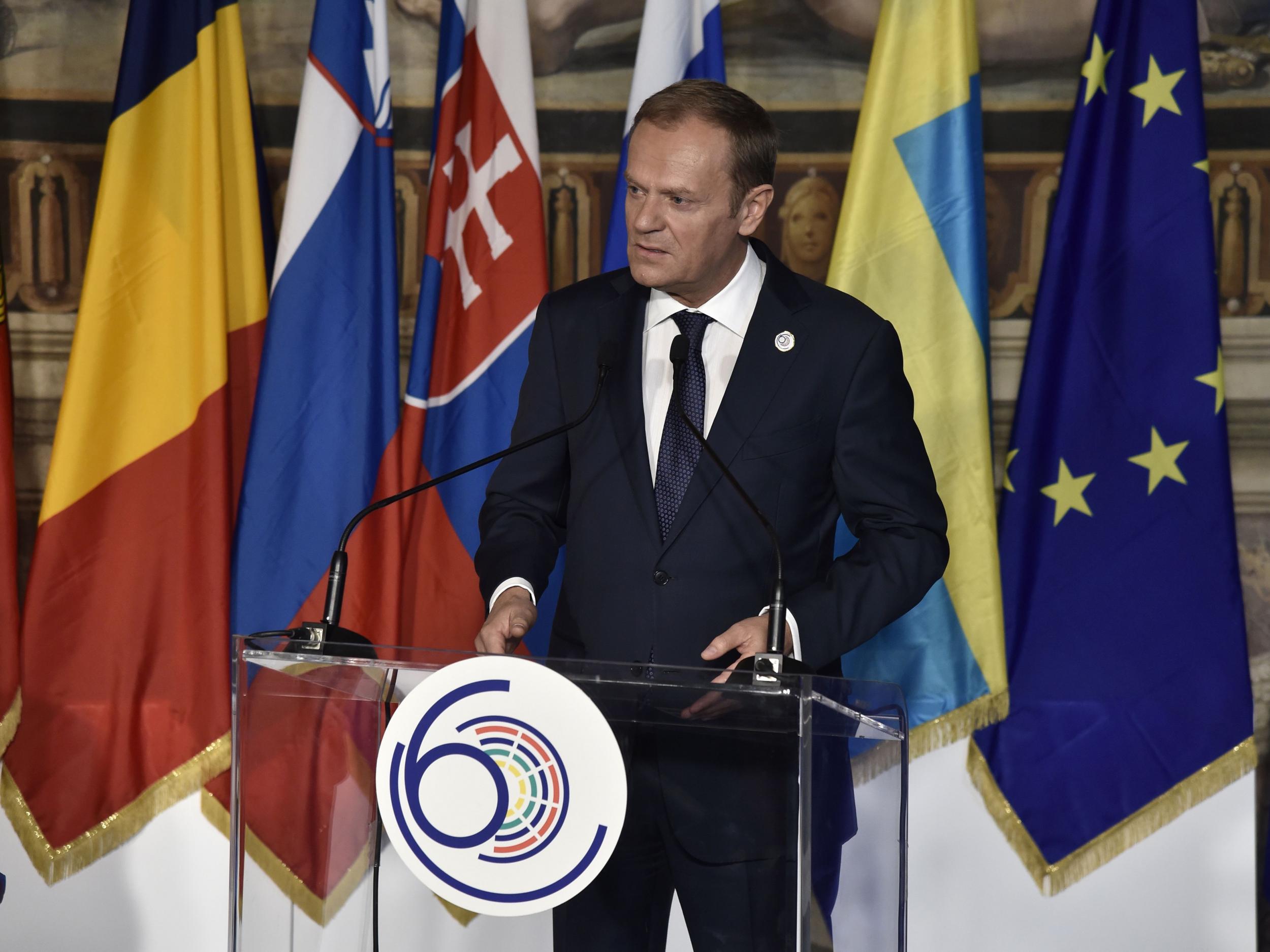Rome treaties anniversary meeting: EU 'will either be united, or will not be at all', says European Council President Donald Tusk
'Only a united Europe can be a sovereign Europe in relation to the rest of the world'

Your support helps us to tell the story
From reproductive rights to climate change to Big Tech, The Independent is on the ground when the story is developing. Whether it's investigating the financials of Elon Musk's pro-Trump PAC or producing our latest documentary, 'The A Word', which shines a light on the American women fighting for reproductive rights, we know how important it is to parse out the facts from the messaging.
At such a critical moment in US history, we need reporters on the ground. Your donation allows us to keep sending journalists to speak to both sides of the story.
The Independent is trusted by Americans across the entire political spectrum. And unlike many other quality news outlets, we choose not to lock Americans out of our reporting and analysis with paywalls. We believe quality journalism should be available to everyone, paid for by those who can afford it.
Your support makes all the difference.European Council President Donald Tusk has warned that the EU “will either be united, or will not be at all”.
Without Theresa May, leaders from the other 27 EU members, were marking the union's 60th anniversary at an informal summit in Rome.
Mr Tusk urged the bloc to come together following Britain’s planned departure.
But the run-up to the celebrations had been tainted by bitter divisions among EU members, with both Poland and Greece threatening to refuse to sign a formal declaration of unity unless given concessions on key issues such as immigration and austerity.
Eventually they joined their fellow members in signing the Rome declaration, a success for a bloc that in recent years has appeared divided in the face of an influx of refugees from the Middle East and Africa.
Mr Tusk told EU leaders: “Europe as a political entity will either be united, or will not be at all,” adding that ”only a united Europe can be a sovereign Europe in relation to the rest of the world”.
He said: “Only a sovereign Europe guarantees independence for its nations, guarantees freedom for its citizens.“
But while much of the language surrounding the Rome treaty related to unity, a principle of disagreement was central to the accord itself.
The agreement will enshrine the idea of a multi-speed bloc, where some nations can move ahead while others stay on the sidelines on specific issues.
The declaration says: “We will act together, at different paces and intensity where necessary, while moving in the same direction.”
The EU has often done this in practice in the past, with only 19 nations in the eurozone and not all members participating in the Schengen zone of borderless travel.
German Chancellor Angela Merkel sought to assuage fears that the multi-speed model would lead to a further unravelling of unity.
“The Europe of different speeds does not in any way mean that it is not a common Europe,” Ms Merkel said after the ceremony. “We are saying here very clearly that we want to go in a common direction. And there are things that are not negotiable,” she added, referring to the EU freedom of movement, goods, people and services.
In a series of speeches, EU leaders also acknowledged how the bloc had strayed into a complicated structure that had slowly lost touch with its citizens, compounded by the severe financial crisis that struck several EU nations over the past decade.
Italian Prime Minister Paolo Gentiloni, the host of the summit, said over the past dozen years the EU's development had stalled.
Theresa May's midweek deadline for Britain's triggering of Article 50, will launch the two-year countdown to Brexit.
In the UK, tens of thousands of people took to the streets of London on Saturday to demand plans for Brexit be reversed.
Campaigners said the march had been organised to make pro-EU voices heard and to condemn the Leave campaign, which they claim was based on lies and incited hatred.
Associated Press contributed to this report
Join our commenting forum
Join thought-provoking conversations, follow other Independent readers and see their replies
Comments